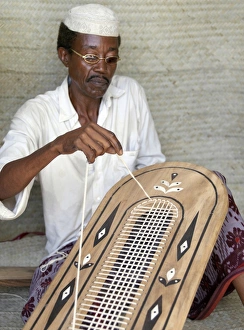Swahili Culture Collection
Discover Swahili culture through the lens of everyday life: An inhabitant of Pate village rides his donkey through sun-kissed streets
All Professionally Made to Order for Quick Shipping
Discover Swahili culture through the lens of everyday life: An inhabitant of Pate village rides his donkey through sun-kissed streets, past ancient ruins where the 17th century tomb of Mwenya Bunu lies. A Lamu man strings the back of a traditional Lamu-style dhow, while a woman demonstrates the use of the shiraa, a Swahili mortar and pestle. Pate farmers tend to their tobacco crops among the coral formations, their eyes protected by traditional shades. Rusted cannons tell tales of past battles at Siyu Fort, where the Sultan of Zanzibar once held court. At sunrise, the fishing fleet sets sail from the sheltered waters of the old historic town of Faza. A Lamu woman's eyes, adorned with intricate hand and body designs, reflect the rich heritage of this ancient civilization.











